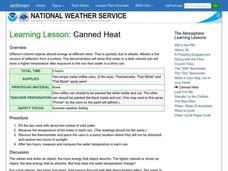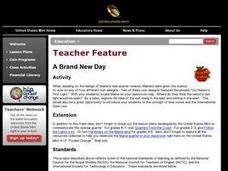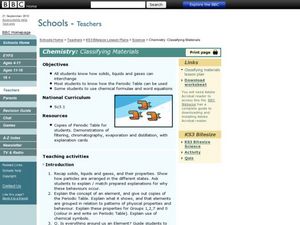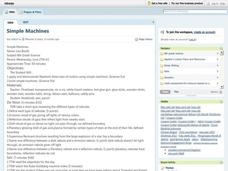Curated OER
The Shadow Knows
Sixth graders examine the relationship between light and the angle it strikes objects. In groups, they shine light from a flashlight on different objects and describe how it affects the shadow. To end the lesson, they complete a...
Curated OER
Canned Heat
Learners demonstrate that light and dark colored objects absorb the sun's radiation at different rates. They experiment with the temperature change of water in two locations and discuss the results.
Curated OER
Radiation from Space
In this radiation worksheet, high schoolers review the different types of radiation waves that come from space and the different telescopes used to detect this radiation. This worksheet has 17 true or false questions.
Curated OER
Jell-O Optics
Students observe an activity with Jell-O to learn about optics. For this investigative lesson students fill out a handout on the activity that helps them to investigate the index of refraction and the speed of light.
Curated OER
A Brand New Day
Students locate Maine on a classroom map and discuss if Maine is where the nation's first light is found, where would the nation's last light be seen. They explore the idea of the sun rising in the east and setting in the west.
Curated OER
Harnessing Solar Energy
Young scholars identify the properties of light from the sun. In groups, they participate in experiments with solar collectors, cookers and calculators to determine which one harnesses the most energy. They record their observations...
Curated OER
Solar Energy: Become a Sun Chef!
Pupils design and construct a solar cooker. They use the Internet to research solar collectors and the process of changing light energy into heat energy.
Curated OER
Is It Lunar or Lunacy?
Sixth graders are introduced to the moon and its phases. Individually, they draw a sketch of each phase of the moon and read a short article about Galileo. To end the lesson, they examine the difference between refracting and...
Curated OER
Modeling Day and Night
Students complete a science experiment to study the role of night and day on sleep patterns. In this sleep patterns lesson, students brainstorm about night and day and the causes for the rotations on Earth. Students work in groups to...
Curated OER
The Fog Won't Cloud Your Artist's Eye
Students examine art that shows some type of weather event. After watching two filmstrips on weather, they create a fog picture of themselves and read about lighting and thunder. They paint pictures in the style of five artists they have...
Curated OER
Charting the Moon
Sixth graders observe changes in the moon's appearance over a month and keep records of their observations. They write a plan for recording what they see, and a paragraph reflecting on what they have learned over the course of the month.
Curated OER
Is Your Blue Really Blue? [Metamerism]
Students examine color perception and how it relates to metamerism. For this color lesson students complete a lab activity that shows them the three basic components of color perception.
Curated OER
The Geometry of Real Images
In this math worksheet, students read the examples for using the techniques of mathematical modeling. They draw the angles in order to simulate the reflection of light while using a concave mirror.
Curated OER
20/20 Vision
Students determine their own eyesight and calculate what a good average eyesight value for the class would be. They examine how technology enhances eyesight and how engineers play an important role in the development of these technologies.
Curated OER
The Sky Jeopardy
First graders reinforce concepts about sun, moon, day, night and sky by playing the Sky Jeopardy game. In the end, 1st graders get to nibble crackers in order to show the different phases of the moon.
Curated OER
Water and Ice
Students explore water. In this water lesson, students explore the physical properties and states of water. They observe how water changes states and document what they see.
Curated OER
Chemistry: Classifying Materials
Students classify materials. In this chemistry lesson, students examine the properties of solids, liquids, and gases. Students discover the elements, compounds, and chemical symbols.
Curated OER
Newton's Color Wheels
Students investigate the effects of light while experimenting with several color wheels. They make observations and record them. The information from the observations is used to help fuel the discussion that follows. The lesson includes...
Curated OER
Genetic Engineering/Biotechnology
Learners create a paper model of a plasmid and insert a DNA molecule that contains a specific gene into the plasmid. They complete an actual transformation involving E. coli bacterium and relate the two activities to one another.
Curated OER
Mineral Identification
In this mineral identification worksheet, students match 10 terms to their definitions. Terms include types of minerals, tests and characteristics of minerals. They write down the tests used to identify an unknown mineral and they fill...
Curated OER
Simple Machines
Students engage in a lesson that is concerned with the concept of a simple machine and uses the law of motion to justify why they operate. Students explore the laws by constructing some simple machines to illustrate the concepts.
Curated OER
Keeping Warm When it is Cold: How does a polar bear keep warm?
Students make a model of a polar bear and discuss why fur/skin color is important. They also perform a simple experiment using black and white socks to determine how color affects temperature.
Curated OER
Mixing Colors
Students understand why we see various colors. In this mixing colors lesson, students experiment with different food coloring to explore how colors are made. Students record on a data sheet the colors they see.
Curated OER
Solar S’Mores
Students use the energy of the sun to make s'mores. In this solar energy lesson, students gather the listed materials and follow the procedures to find out if they can make s'mores using solar energy.













![Is Your Blue Really Blue? [Metamerism] Lesson Plan Is Your Blue Really Blue? [Metamerism] Lesson Plan](http://content.lessonplanet.com/resources/thumbnails/299613/large/otq2otizlmpwzw.jpg?1315624134)











